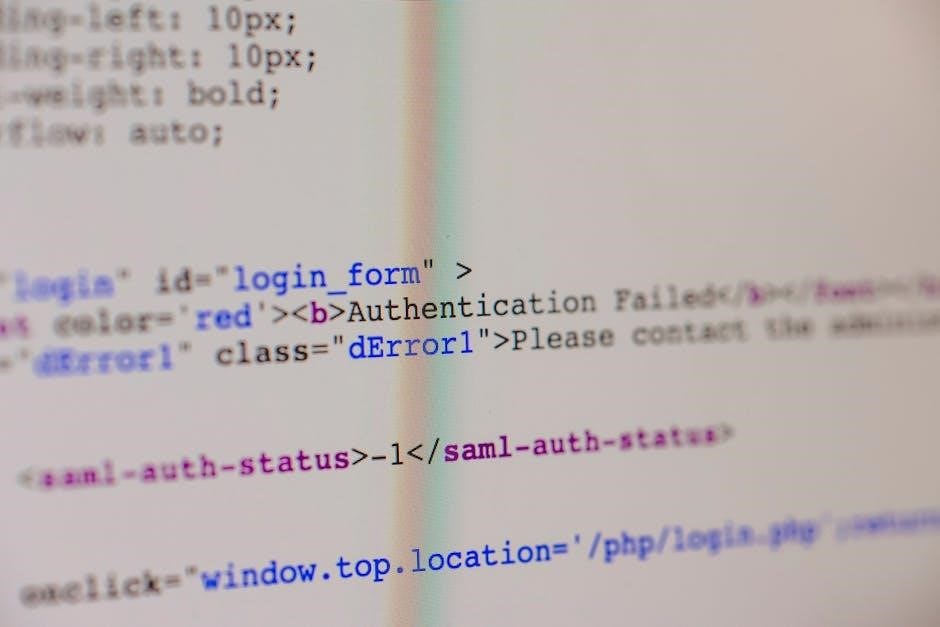form 4549 instructions
IRS Form 4549‚ or the Income Tax Examination Changes form‚ is used to notify taxpayers of proposed adjustments following an audit. It outlines changes to income‚ deductions‚ credits‚ penalties‚ and interest. Taxpayers must review the form carefully to agree or disagree with the adjustments‚ ensuring compliance with IRS requirements.
Overview of IRS Form 4549
IRS Form 4549‚ known as the Income Tax Examination Changes form‚ is issued after an audit or when the IRS prepares a Substitute for Return (SFR). It details proposed adjustments to taxable income‚ deductions‚ and credits‚ along with penalties and interest. The form explains the reasons for the changes and provides options for taxpayers to accept or dispute the adjustments. It also includes instructions for signing and returning the form or requesting reconsideration. Taxpayers must carefully review Form 4549 to ensure they understand the proposed changes and their implications.
When Form 4549 is Issued
Form 4549 is issued by the IRS after an audit or when a Substitute for Return (SFR) is prepared. It is provided to notify taxpayers of proposed changes to their tax return‚ typically following a review of their filed return or when discrepancies are identified. The form is part of the examination process and is sent to inform taxpayers of adjustments‚ penalties‚ or other changes resulting from the audit. It serves as official notification of the IRS’s findings and is essential for taxpayers to understand their tax liability adjustments.

Key Sections of Form 4549
Form 4549 includes sections detailing proposed adjustments to income‚ deductions‚ and credits‚ as well as penalties‚ interest‚ and refund or balance due information. These sections provide a clear overview of the IRS’s findings and required actions.
Understanding the Proposed Adjustments
Form 4549 details proposed adjustments to your tax return‚ including changes to income‚ deductions‚ and credits. These adjustments are based on the IRS audit findings and may result in additional taxes‚ penalties‚ or interest. Each adjustment is explained‚ along with the reasoning behind it; Taxpayers should carefully review these changes to ensure accuracy. If you disagree‚ gather supporting documentation to challenge the adjustments. Understanding these proposed changes is crucial for deciding whether to accept them or request further review through an audit reconsideration process.
Penalties and Interest Explained
Form 4549 includes penalties and interest related to the proposed adjustments. Penalties may arise from underreporting income‚ overclaiming deductions‚ or failing to comply with tax laws. Interest accrues on unpaid taxes from the original due date to the date of payment. The form details the calculated penalties and interest‚ which must be paid along with any additional tax owed. Ignoring these charges can lead to further penalties and collection actions. Paying the amount due promptly can stop additional interest from accruing.
Refund or Balance Due Information
Form 4549 provides details on any refund due or balance owed based on the proposed adjustments. If the IRS determines you overpaid taxes‚ a refund will be issued; Conversely‚ if additional taxes are owed‚ the form will show the amount due‚ including penalties and interest. It’s crucial to review this section carefully to ensure accuracy. If you owe‚ prompt payment is recommended to avoid further interest accrual. If you’re due a refund‚ the IRS will process it upon accepting the adjustments. This section ensures clarity on your final tax liability.

Instructions for Completing Form 4549
Review the form carefully‚ understand the proposed adjustments‚ and follow the provided instructions. Sign and date where required‚ submit promptly‚ and seek professional advice if needed.
How to Review and Understand the Form
Begin by carefully reading each section of Form 4549 to understand the proposed adjustments. Compare the changes with your original tax return to identify discrepancies. Review the calculations for accuracy‚ focusing on income‚ deductions‚ and credits. Check for any penalties or interest applied. If you agree with the adjustments‚ sign and date the form as instructed. If you disagree‚ note your objections and consider submitting additional documentation or requesting reconsideration. Ensure all steps are completed accurately to avoid further issues with the IRS.
Sign and Date the Form
Once you’ve reviewed Form 4549 and agree with the adjustments‚ sign and date the form in the designated area. Your signature confirms acceptance of the changes and makes the adjustments official. If you’re submitting a payment‚ include a check payable to the U.S. Treasury. Ensure your name‚ address‚ and Social Security number or Employer Identification Number are correctly listed. If you’re unable to sign‚ a legally authorized representative may do so on your behalf. Review the form for accuracy before returning it to the IRS to avoid processing delays.
Submitting the Form to the IRS

After signing and dating Form 4549‚ submit it to the IRS as instructed. Enclose any required payment and use the provided envelope for mailing. Ensure the form is sent to the address listed in the instructions or on the form itself. Timely submission avoids penalties and interest on unpaid balances. If you cannot pay the full amount‚ contact the IRS to discuss payment plans or alternatives. Proper submission ensures your case is processed efficiently‚ preventing further collection actions or additional fees.
Special Instructions for Disagreeing with the Changes
If you disagree with the proposed adjustments on Form 4549‚ you must request an audit reconsideration. Submit Form 12661 along with a detailed statement explaining your position and include supporting documentation. Clearly outline why you disagree and provide evidence to contest the IRS findings. This process allows you to challenge the proposed changes formally. Ensure all materials are organized and sent to the address listed in the form instructions. Timely submission is crucial to avoid further penalties or collection actions while your case is reviewed;

What to Do If You Agree with the Changes
Sign and date Form 4549‚ return it in the provided envelope‚ and remit payment if due. Ensure timely submission to avoid penalties and finalize the agreement.
Signing and Returning the Form
Review Form 4549 carefully and sign and date it to acknowledge agreement with the proposed changes. Use the provided envelope to return the signed form to the IRS. If a payment is due‚ include it with the form to avoid additional penalties and interest. Ensure timely submission to finalize the agreement and prevent further collection actions. Keep a copy for your records. This step confirms your acceptance of the adjustments and initiates the process to resolve your tax liability.
Paying the Amount Due
If you agree with the adjustments on Form 4549‚ payment of the amount due is required to avoid additional penalties and interest. You can pay by check‚ money order‚ or electronically through IRS payment options. Include the payment voucher from the form to ensure proper processing. If unable to pay in full‚ consider setting up an installment agreement by contacting the IRS. Timely payment prevents further collection actions and resolves your tax liability. Keep records of payment for future reference.

What to Do If You Disagree with the Changes
If you disagree with the changes on Form 4549‚ you can request an audit reconsideration‚ submit additional documentation‚ or appeal the decision to resolve the dispute.
Requesting an Audit Reconsideration
If you disagree with the changes on Form 4549‚ you can request an audit reconsideration by submitting additional documentation to support your position. This process allows the IRS to review your case again‚ considering new evidence or information not previously provided. You must clearly explain why you believe the proposed adjustments are incorrect and provide detailed records or receipts to back up your claims. The IRS will then reevaluate your case and determine if the original adjustments should be modified or upheld. This step is crucial for resolving disputes efficiently and ensuring fairness in the audit process.
Submitting Additional Documentation
When requesting an audit reconsideration‚ submit clear and relevant documentation to support your case. Include receipts‚ invoices‚ bank statements‚ and any other records that contradict the IRS findings. Organize documents by tax year and type‚ ensuring they directly address the disputed adjustments. Attach a written explanation detailing why the proposed changes are incorrect and how your records justify the differences. This structured approach helps the IRS review your case efficiently and makes it more likely to resolve the issue in your favor. Timely submission is essential to avoid further penalties or delays.
Appealing the Decision
If you disagree with the proposed adjustments‚ you can appeal the decision by requesting a hearing with the IRS Office of Appeals. Submit Form 12203‚ Request for Appeals Review‚ along with supporting documentation‚ to challenge the findings. Clearly explain why you disagree and provide evidence to refute the proposed changes. The IRS will review your case independently‚ and if unresolved‚ you may escalate it to Tax Court. Ensure timely submission‚ as there are statutory deadlines for filing an appeal. Proper preparation and evidence are crucial for a successful appeal.

Payment Options and Plans
Taxpayers can pay the full amount due or set up an installment agreement to make monthly payments. Contact the IRS to discuss payment plans tailored to your situation.

Full Payment Options
Taxpayers can settle their balance in full by sending a check or money order with Form 4549. Payments should be made payable to the “United States Treasury” and include the taxpayer’s name‚ Social Security number‚ and tax year. Electronic payments are also accepted via the IRS website.Detach the voucher from Form 4549 and enclose it with your payment. Ensure the payment amount matches the balance due to avoid delays. Paying in full stops further penalties and interest from accruing. Return the signed form and payment promptly to finalize the agreement.
Setting Up an Installment Agreement
If unable to pay the full amount‚ taxpayers can request an installment agreement by completing Form 9465. Attach it to Form 4549 and submit to the IRS. This allows monthly payments toward the balance. Online agreements can be set up via the IRS website‚ while paper filers must include Form 9465. Ensure the signed Form 4549 is returned with the agreement. Note that setup fees apply‚ and late payments may incur penalties. This option helps avoid collection actions while satisfying the tax debt over time.

Consequences of Ignoring Form 4549
Ignoring Form 4549 can lead to additional penalties‚ interest‚ and IRS collection actions‚ such as liens‚ levies‚ or wage garnishment. Unresolved issues may escalate legal consequences.
Additional Penalties and Interest
Failing to respond to Form 4549 can result in additional penalties and interest on the unpaid balance. The IRS may impose further fines and accrue interest on the original amount due‚ increasing the total liability. Over time‚ this can significantly escalate the debt‚ making it more difficult to resolve. Ignoring the form does not halt the accumulation of penalties and interest‚ which continues until the matter is resolved. It is crucial to address the issue promptly to avoid further financial consequences and potential legal actions.
Collection Actions by the IRS
If Form 4549 is ignored‚ the IRS may take collection actions to recover the unpaid amount. This can include placing a lien on property‚ seizing assets‚ or levying bank accounts. The IRS may also garnish wages or intercept tax refunds to satisfy the debt. Collection actions escalate over time‚ making it essential to address the issue promptly. Taxpayers who fail to respond risk facing serious financial consequences‚ emphasizing the importance of resolving the matter before the IRS takes enforcement steps.

FAQs About Form 4549
FAQs about Form 4549 address common questions‚ such as why it was received‚ what actions to take‚ and how to respond if agreed or disagreed with the changes.
Common Questions and Answers
What is Form 4549? It is the Income Tax Examination Changes form‚ detailing IRS-proposed adjustments to your tax return; Why did I receive it? It follows an audit or IRS review of your taxes. What if I agree? Sign‚ date‚ and return the form with payment if needed. What if I disagree? Submit additional documentation or request reconsideration. How do I pay? Full payment or installment agreements are options. Can I appeal? Yes‚ follow IRS procedures for further review; Understanding these steps helps ensure compliance and resolve your tax situation effectively.
